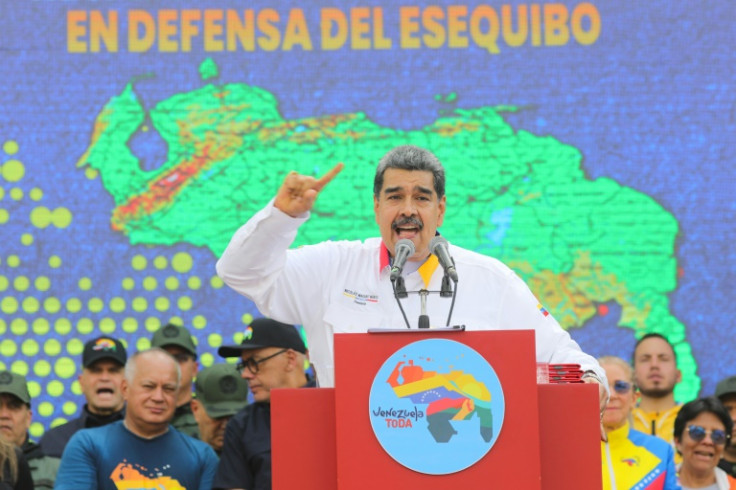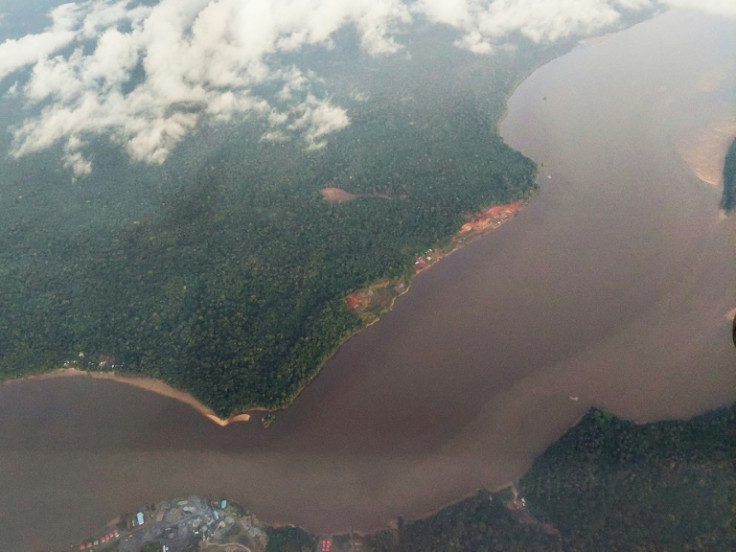
As the Venezuelan elections get closer, and the government sees a competitive opposition ahead in the polls, a new report ponders about the possibility that president Nicolás Maduro will "manufacture" an escalation with neighbor Guyana to secure his grip on power.
The report, by the Center for Strategic and International Studies, shows increased military presence by Venezuelan forces near the Essequibo, a region that is administered by Guyana but Caracas claims as its own.
Venezuela has brought its claim to the Essequibo to the forefront of regional relations since holding a referendum last year (approved by an overwhelming majority) to take over the territory and create a Venezuelan province there. It has also accused the Georgetown government of "defying and provoking" Caracas by granting concessions to exploit the areas natural resources, particularly oil.
So far there have not been any attacks nor clashes in the area nor the Essequibo as a whole, but Venezuelan authorities said in mid-April that the country will keep its armed forces deployed in its coast near the Atlantic until the dispute is solved in a way that is "satisfactory" to Caracas.
The report, nonetheless, analyzes potential scenarios where the government could escalate tensions in its favor. It discusses using a sense of "militarized patriotism in peacetime" to increase its standing, noting the government has "saturated Venezuela with propagandist claims about Guyana's government and that any move by Guyana to bolster its defenses should be interpreted as an offensive preparation for war."
A more drastic scenario considers the possibility that Maduro engages in a "true gambit to manufacture a regional crisis in the aftermath of a stolen election." "In such a scenario of a post-election crisis, Venezuela's rhetoric risks crossing a Rubicon beyond which it cannot return without taking some kind of action against Guyana," the report adds.
This can prove a thin needle to thread for Maduro, as he has "little to gain and much to lose from a full blown conflict," according to the document. It lists the army's obstacles conducting complex operations in the "unforgiving" area, and the fact that an outright aggression would "also isolate Maduro from the international community he appears keen to rejoin."

Moreover, it could "galvanize support for multilateral sanctions that could deliver the death knell to the anemic economic recovery Maduro is banking on for domestic support."
The exit ramp can also prove tricky, as its "constant drumbeat" is "helping to institutionalize a sense of perpetual prewar footing." So even if Maduro "were to cut a lopsided deal with Guyana for access to offshore oil blocks, he likely could not de-escalate and swiftly dismantle institutions" tasked with managing the Essequibo province created by Caracas.
"De-escalation could even disqualify Maduro's presidential bid, as Venezuela's Essequibo defense law (passed by the Chavista-controlled National Assembly) bars anyone who denies Venezuelan sovereignty over the Essequibo from running for public office," the report notes.
The military could even act without Maduro's approval. should he end up in a position where he is "compelled to act in order to maintain the support of the armed forces domestically, or else the military (or elements of it) will act without approval from Caracas."
Considering these scenarios, the report calls for the international community to remain vigilant. "The potential for miscalculation is highest if Venezuela feels it will not face substantial consequences for continuing to pursue a compellence strategy," and key regional players are called to "signal publicly and in private that they are watching Venezuela at every turn."
© 2024 Latin Times. All rights reserved. Do not reproduce without permission.



.png?w=600)



